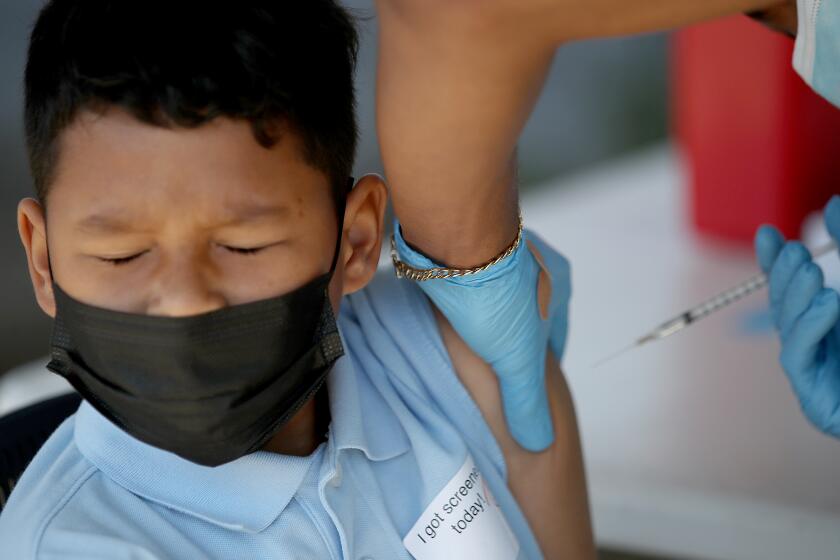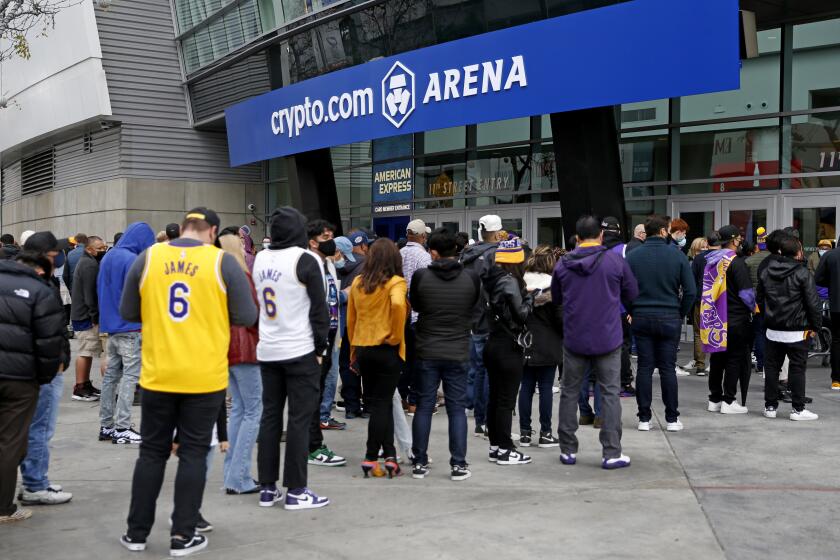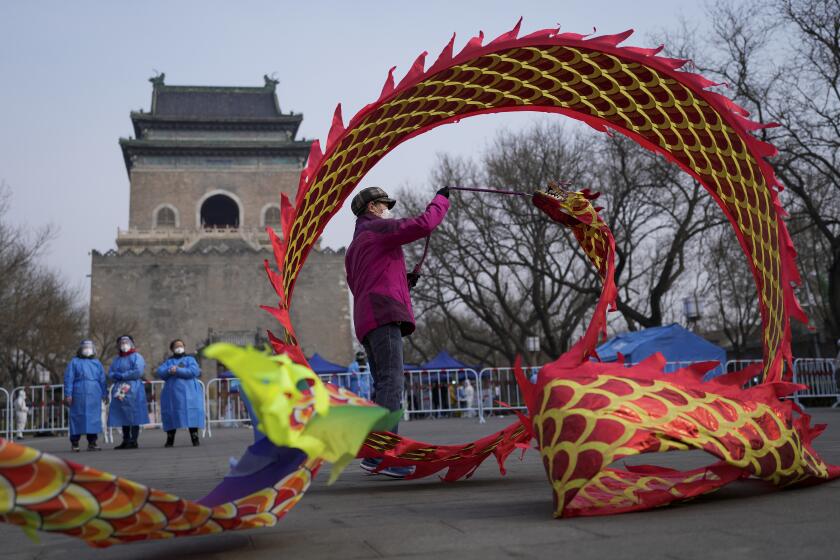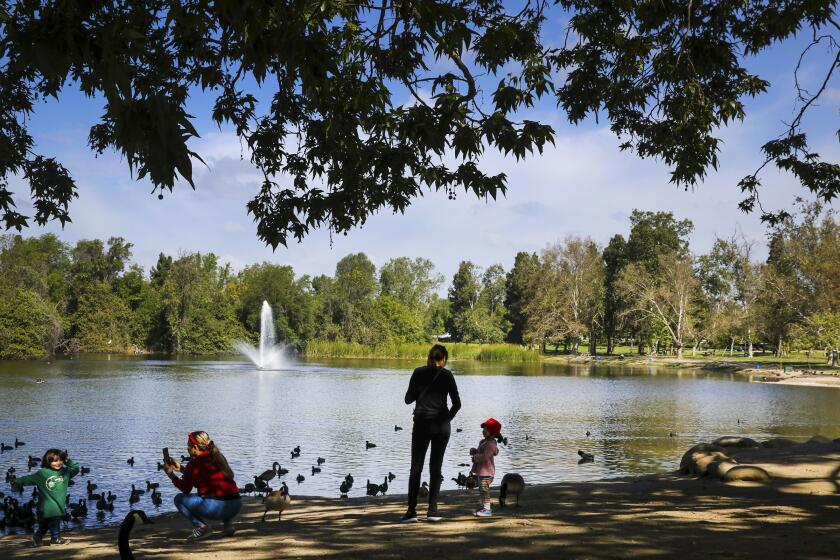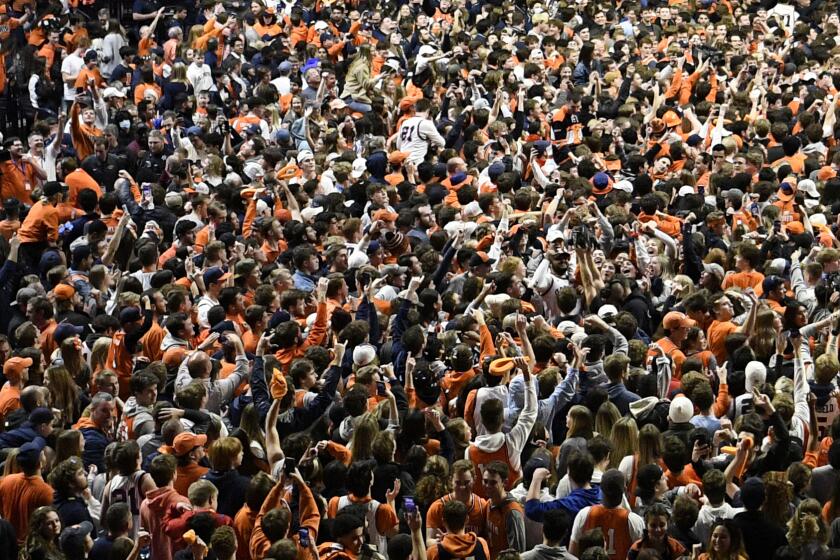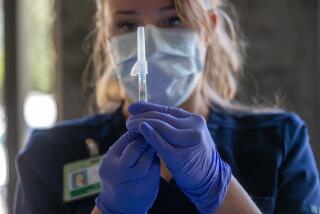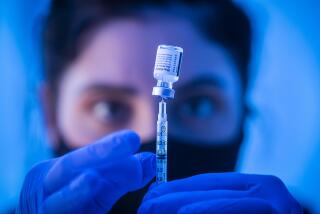L.A. moves to roll back vaccine verification at restaurants, businesses despite BA.2 concerns
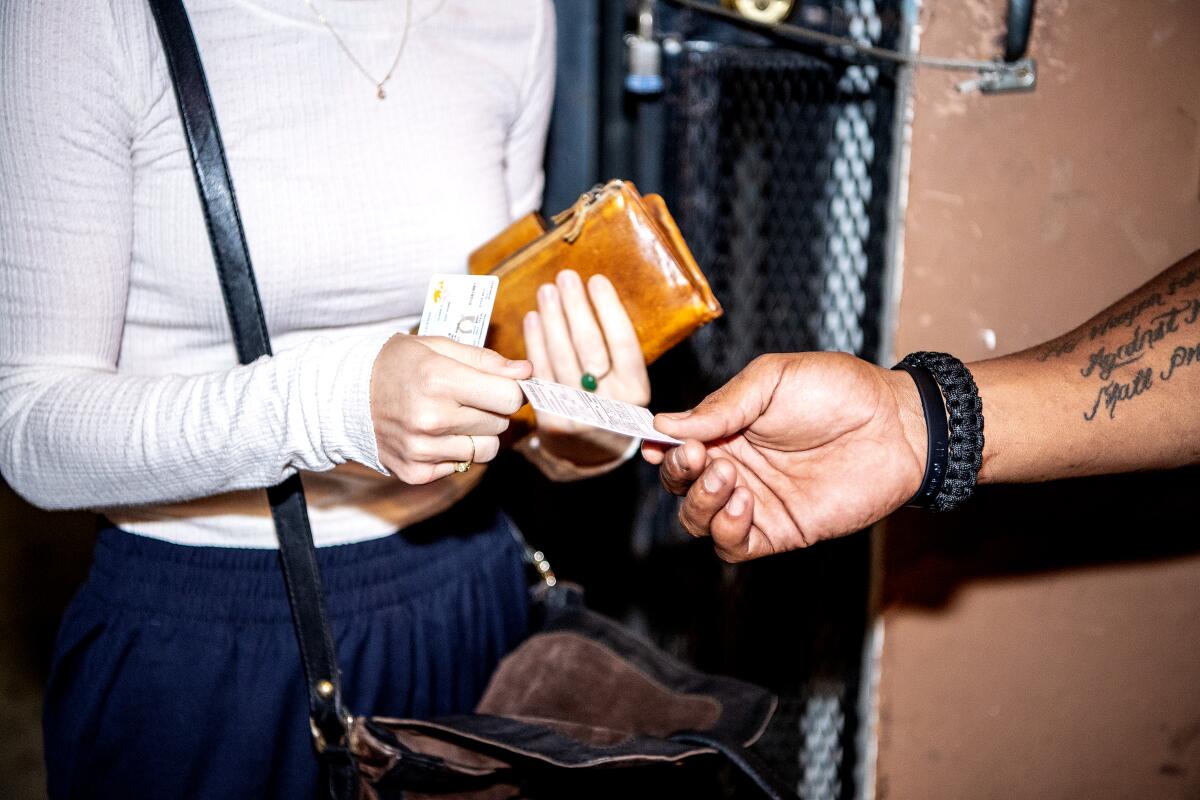
- Share via
Los Angeles on Wednesday took another step toward rolling back its COVID-19 vaccine verification requirements for indoor restaurants, gyms, movie theaters and other businesses even amid concerns that circulation of the “stealth” Omicron subvariant, BA.2, might fuel an increase in cases this spring.
The City Council voted 13 to 1 to make it voluntary for such businesses to verify that people patronizing their indoor areas are vaccinated. The changes would also remove such requirements for big outdoor events.
Because the vote was not unanimous, the proposed ordinance altering the city rules will undergo a second, procedural vote next week. Councilman Mike Bonin, the lone vote against the measure, said he was concerned about lifting the requirements in indoor spaces at this time.
“I know it feels like we’re out of the woods. It feels like we’re all going back to normal. But there’s new variants and new strains all the time,” Bonin said. “This BA.2 is spreading. ... I hope I’m wrong and this proves to be a foolish vote, but I’m still concerned.”
For now, weekly coronavirus cases remain flat nationally and in California, and are still declining in Los Angeles County. But the data could be a prelude to what’s to come.
Government requirements for vaccine verification at businesses, touted just months ago as an important safety measure in higher-risk settings, are now fast being removed.
With coronavirus cases and COVID-19 hospitalizations on the downswing, the L.A. County Department of Public Health earlier this month relaxed its own screening rules at outdoor mega-events — such as at theme parks, concert venues and sports stadiums — and indoor portions of bars, wineries, breweries, distilleries, nightclubs and lounges.
Effective April 1, state officials also will lift the requirement that those attending indoor events with crowds of more than 1,000 must show proof they have been vaccinated against COVID-19 or recently tested negative for the coronavirus.
However, that’s not to say such requirements will vanish entirely. Local public health officials, as well as individual venues, may opt to keep them.
Starting April 1, guests at concerts, conventions and sporting contests will no longer be required to show proof of vaccination or a negative coronavirus test, though screening is still strongly recommended.
Officials say the recent relaxation of vaccine verification requirements and widespread lifting of mask mandates reflect the ground California has won in its fight against the two-year-old pandemic.
Over the last week, California has reported an average of a bit under 3,900 new coronavirus cases per day — a far cry from the 120,000-plus daily infections that were being tallied at the Omicron peak, according to data compiled by The Times.
As of Tuesday, 1,774 coronavirus-positive patients were hospitalized statewide. The daily census hasn’t consistently been this low since last July.
Although conditions have improved to the point officials and experts say it makes sense to pivot from some mandatory safety measures, they continue to strongly recommend residents and businesses take voluntary steps to protect themselves and their customers — such as masking indoors while in public.
Health officials and epidemiologists also have cautioned that California and the country could soon see coronavirus cases resurge with the Omicron subvariant BA.2, which is 30% to 60% more contagious than the original Omicron variant.
BA.2 is being blamed for recent spikes in cases in other parts of the globe, including the United Kingdom — a particularly troubling development, as conditions there have typically been a harbinger for the pandemic’s trajectory in the United States.
Already, the proportion of BA.2 cases is rising across the U.S. and along the West Coast, new federal forecasts show.
Nationally, BA.2 constituted an estimated 35% of analyzed coronavirus samples between March 13 and March 19; the previous week, it made up 22%, according to data published Tuesday by the U.S. Centers for Disease Control and Prevention.
In the Southwestern U.S. — which includes California, Arizona, Nevada and Hawaii — BA.2 made up an estimated 41% of coronavirus samples. The previous week, it was 28%.
The World Health Organization says new coronavirus cases globally increased by 7% in the last week, driven by the Western Pacific.
It’s hard to know for certain what BA.2’s growth will mean for the nation. It’s possible the subvariant could develop into a full-blown surge and strain hospitals, especially in areas with poor vaccination and booster rates. But the end result could be just a slower decline in cases, with communities better protected since the winter Omicron wave infected so many people and left them with an extra immunity boost, at least for the short term.
“It’s not all as bad as you think,” said Dr. George Rutherford, a UC San Francisco epidemiologist who is optimistic that BA.2 will spare California from a difficult surge.
But experts say it’s still important that people who have had prior infection get vaccinated and boosted because the strength and duration of natural immunity appear to be less than through vaccinations.
“We do have an opportunity to proactively prepare by maintaining our response capacity and increasing vaccination and booster coverage, particularly among those who are most vulnerable,” L.A. County Public Health Director Barbara Ferrer said during a recent briefing.
Roughly 75% of Angelenos ages 5 and older have been fully vaccinated, and 57% of eligible residents have gotten a booster, according to county health officials. However, about 2.6 million people still have not yet availed themselves of a booster dose.
What should Californians be doing now to prepare for a possible spring surge of infections by the Omicron BA.2 subvariant.
Council President Nury Martinez said that if a surge in coronavirus cases returns, the city would follow the guidance of the county and state departments of public health on what steps to take. She added that “the city will continue to protect those most vulnerable in places where we have direct oversight, such as city buildings.”
Although the city is moving to make vaccination verification a voluntary measure at many locations, “we have maintained the proof of vaccination requirement for entering indoor portions of our city facility,” Martinez said in a statement.
The L.A. city rules requiring vaccination checks at restaurants and other businesses, dubbed SafePassLA, have infuriated some critics who called them discriminatory and tyrannical. Leaders of the Libertarian Party of Los Angeles County, who had been pursuing a ballot measure to roll back the rules, said they would work to prevent any similar requirements from being reinstated in the future.
Before Wednesday’s vote, several people phoned in to the council meeting to denounce the vaccine verification rules. “It’s not enough that they rescind these things,” said Shawn Osborne, a representative of the Libertarian Party of Los Angeles County. “They’ve destroyed the economy. They’ve set people at each other’s throats. They’ve caused division and hate. We’re not in a better place because of this.”
Caller Patty Glueck expressed concern about rolling back the requirements, saying that a member of her family is immunocompromised. She called a rollback premature in light of the spread of the new subvariant.
Scientists worry that a contagious descendent of Omicron may soon drive COVID-19 cases up in the United States just as it has in Europe and Asia.
The L.A. rules have been in place since November, but the city has not aggressively enforced them. City officials said they had decided to hold off issuing citations to businesses that violated the rules until February. Even after February came and went, no citations were handed out: As of this week, the Los Angeles Department of Building and Safety said no businesses had been cited or fined, although six had been sent notices urging them to correct violations.
At the Wednesday meeting, council members took steps to roll back other ordinances introduced during the pandemic, including one requiring grocery stores to set aside an exclusive time for elderly or disabled customers to shop. Councilman Bob Blumenfield, who first proposed rolling back that ordinance last year, said it was not being enforced and was no longer necessary.
The ordinance was adopted “as an emergency measure when there were long lines to get into grocery stores, widespread product shortages and empty shelves, no vaccines, and even before the CDC recommended the wearing of masks by the general public,” Blumenfield said in a statement.
“The conditions that existed two years ago — long lines, empty shelves, no vaccines and no masks — no longer exist,” he concluded.
Council members also took the first step toward repealing an ordinance that allowed people to temporarily defer paying rent at storage facilities during the COVID-19 emergency and rolled back a city resolution that had exempted departments from competitive bidding requirements for contracts tied to the COVID-19 emergency.
More to Read
Sign up for Essential California
The most important California stories and recommendations in your inbox every morning.
You may occasionally receive promotional content from the Los Angeles Times.
